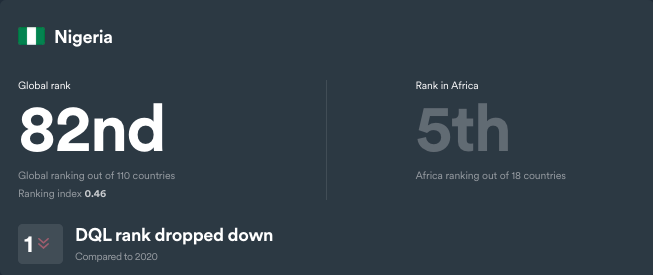Nigeria has been ranked in 82nd position out of 110 countries ranked in this year’s digital quality of life index, with South Africa and Kenya beating Nigeria in internet affordability, e-infrastructure, and e-government.
The ranking, which was done by Surfshark, a cybersecurity company uses five fundamental pillars of digital life – internet affordability and quality, e-infrastructure, e-security, and e-government.
According to the key findings, Nigeria lacks internet affordability – it is 90% worse than the global average, and people in Nigeria have to work the most time in the world to afford the cheapest broadband internet (more than 35 hours) to afford the cheapest broadband internet.
Nigeria has one of the worst electronic governments worldwide – the country ranks 95th in this pillar. But Nigeria’s internet quality is similar to the global average, and its broadband speed growth is one of the fastest on the planet – ranks 16th worldwide.
The country has one of the slowest broadband connection speeds globally (13.45 Mbps), ranking 105th, and slightly faster mobile internet (17.91 Mbps), ranking 96th. However, the country’s broadband speed growth is one of the fastest on the planet, ranking 16th.
Nigeria’s e-security is slightly better than the global average – it ranks 46th in the world, surpassing Kenya, Argentina and South Africa.
Compared to Kenya, Nigeria ranks lower in internet affordability, e-infrastructure, and e-government as the country’s e-government also does not make it to the TOP 90th, falling behind Senegal, Morocco, and Tanzania.
Commenting on the Digital Quality of Life Index, Vytautas Kaziukonis, CEO of Surfshark explained that digital opportunities have proved to be more important than ever during the COVID-19 crisis, stressing the importance for every country to ensure fully remote operational capacities for their economies.
“This is why, for the third year in a row, we continue the Digital Quality of Life research, which provides a robust global outlook into how countries excel digitally. The index sets the basis for meaningful discussions about how digital advancement impacts a country’s prosperity and where improvements can be made,” he added.
In an all-around picture, 6 out of 10 countries holding the highest scores are located in Europe, following last year’s trend. Denmark ranks 1st in DQL for the second year in a row and is closely followed by South Korea. Finland ranks 3rd, while Israel and the U.S. round out the top five of 110 nations that were evaluated. The bottom 5 countries are Ethiopia, Cambodia, Cameroon, Guatemala, and Angola.
Regionally, the U.S. stands out as a country with the highest digital quality of life in the Americas, while South Korea takes the leading position in Asia. Among countries in Africa, people in South Africa enjoy the highest quality of their digital lives whereas Australia leads in Oceania, outperforming New Zealand in various digital areas.
Methodology & data sources
The 2021 edition of the Digital Quality of Life Index is a second, improved iteration of Surfshark’s previous research. This year, the DQL Index is statistically more complex, analytically vigorous, and includes 14 different factors that directly influence the digital quality of life in any given country. With few exceptions, the DQL Index editions (2020 and 2021) are not comparable.
The DQL Index 2021 analyzes 110 countries (as compared to 85 in 2020) around the world in terms of five core pillars: internet affordability, internet quality, e-infrastructure, e-security, and e-government. Underpinning these pillars are 14 indicators that are interrelated and work together to provide a measure of overall digital quality of life.

